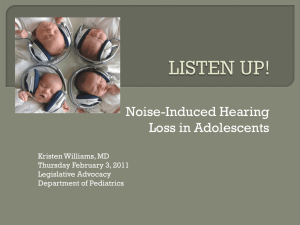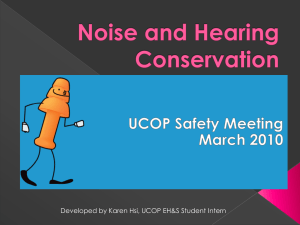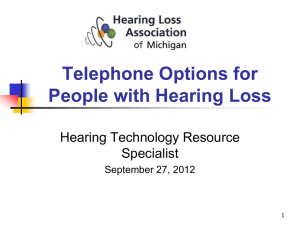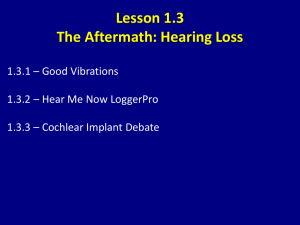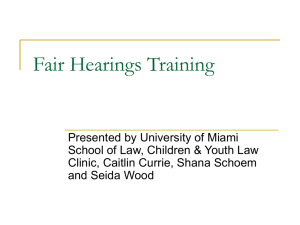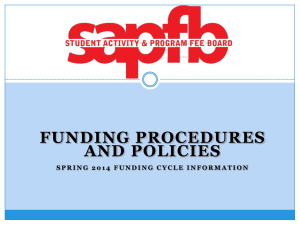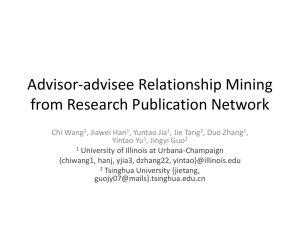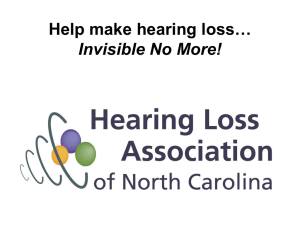Student Conduct Process Presentation
advertisement
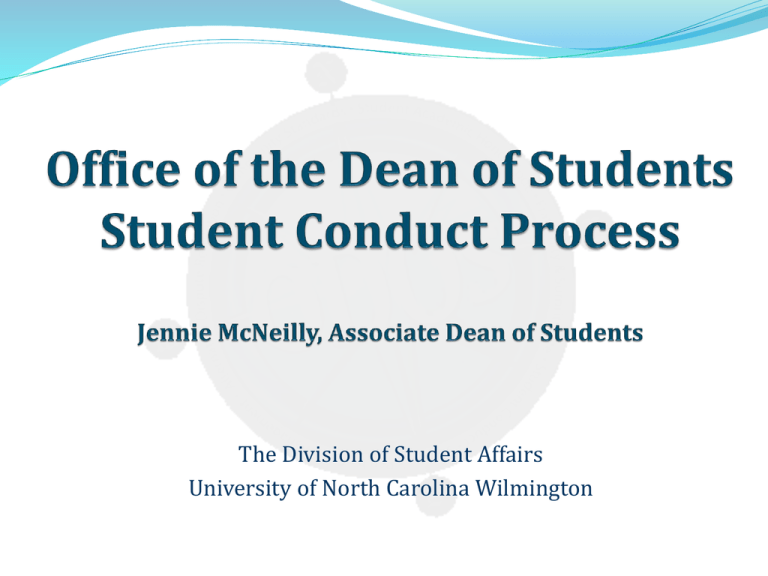
The Division of Student Affairs University of North Carolina Wilmington Educational Philosophy “Good people sometimes make poor choices…” Basis of our Model Educational Informed/Ethical Decision Making Developing Responsible Citizens Campus Safety Our Values Protect and Safeguard Student Rights Provide a Fair and Prompt Process Student Conduct Investigations The Office of the Dean of Students investigates reports which come from Housing & Residence Life, University Police, faculty/staff members, students and the Wilmington community. Student Responsibilities from UNCW Code of Student Life Participants in the student conduct process have the following responsibilities: 1. 2. 3. 4. 5. To know and adhere to the UNCW Code of Student Life. To be honest and complete in all information they provide in the process. To attend all meetings or hearings in a timely manner. To complete any imposed sanctions on time. To participate in a manner that is civil and respectful. Student Rights abridged list from UNCW Code of Student Life Procedural and substantive due process Notice of charges Pre-hearing meeting where all rights and procedures are explained Choice of hearing type: administrative or Campus Conduct Board Opportunity to present testimony, evidence, and witnesses at a hearing (or elect not to appear) Choice of university advisor, non-university advisor, licensed attorney, or non-attorney advocate At least one level of institutional appeal Statistics 2012-2013 1,368 students charged with 2,246 conduct violations Campus Conduct Board heard 15 cases Alcohol possession/use (596) Drug possession/use (139) Drug paraphernalia possession/use (108) Takes, purchases, possesses (27) 30 suspensions; 261 disciplinary probation 176 students charged with academic integrity violations 75 plagiarism; 101 cheating Code of the Board of Governors of the University of North Carolina 700.4.1 Policy on Minimum Substantive and Procedural Standards for Student Disciplinary Proceedings Due process requirements Procedural and substantive requirements for minor and serious violations Including direction for allowing or prohibiting advisors/advocates Guidance for special cases (ex: criminal charges pending, cases of sexual misconduct, etc. Due Process From 700.4.1 Substantive “Notice and opportunity for a hearing” Procedural “the decision reached be neither arbitrary nor capricious…” Sanctions Written reprimand Disciplinary probation CROSSROADS (Challenging Decisions & BASICS) Community service Educational assignments Suspension Expulsion Hearing Process & Appeals Pre Hearing Meeting Meeting with a university hearing officer where rights, responsibilities and procedures are explained Immediate Administrative Hearing Student can elect to immediately discuss and resolve case with university hearing officer, without advisor. Appeal: Tto the Dean of Students or designee. (within two business days) Administrative Hearing Campus Conduct Board Student may request a university advisor, non-university advisor, licensed attorney or non-attorney advocate. ODOS will forward the student written notice of the date, time and place of the hearing at least five (5) days prior to the hearing. Student may request a university or nonuniversity advisor. ODOS will forward the student written notice of the date, time and place of the hearing at least five (5) days prior to the hearing. Appeal: Appeal: For non-suspension level cases, the dean of students/designee shall serve as the appellate officer. For suspension level cases, CCB shall receive the petition. The final decision of CCB may be appealed to the Vice Chancellor of Student Affairs or designee. (within two business days) To the Vice Chancellor of Student Affairs or designee. (within two business days) Some suspension level cases (including summary suspension cases) may be forwarded to the Committee on Extraordinary Disciplinary Emergencies. In cases of expulsion, an appeal to the Board of Governors is permitted. So why does all this matter? Helps graduate students of the highest ethical character, who make informed decisions; Contributes toward increased civility on campus, so students can learn in an conducive environment; Keeps students safe from harm; Aids in retention and graduation rates, a key indicator for measuring a school’s (and a diploma’s) value; Teaches students critical thinking, communication and accountability skills House Bill 74 “Any student enrolled at a constituent institution who is accused of a violation of the disciplinary or conduct rules of the constituent institution shall have the right to be represented, at the student's expense, by a licensed attorney or non-attorney advocate who may fully participate during any disciplinary procedure or other procedure adopted and used by the constituent institution regarding the alleged violation. However, a student shall not have the right to be represented by a licensed attorney or non-attorney advocate in either of the following circumstances: 1) If the constituent institution has implemented a "Student Honor Court" which is fully staffed by students to address such violations. 2) For any allegation of "academic dishonesty" as defined by the constituent institution. “ Licensed Attorneys & Non-Attorney Advocates Addition to 700.4.1 “The institution shall assure that students have the capability to present their evidence and defenses at the hearings. The method for assuring this capability may vary depending on the nature of the case and on the nature of the representation of the institution or the charging party. Each institution must have a policy delineating the participation or prohibition of attorneys and non-attorney advocates. Representation or assistance by attorneys or non-attorney advocates at the hearing is neither required nor encouraged.” Licensed Attorneys & Non-Attorney Advocates from UNCW Code of Student Life “Students who have been accused of a violation of the Code of Student Life (respondents) may be represented by a licensed attorney or non-attorney advocate during any conduct hearing except when: a. The allegation is academic dishonesty. A respondent who elects not to appear at a hearing may not be represented by a licensed attorney or non-attorney advocate at the hearing.” Requirements for Licensed Attorneys & Non-Attorney Advocates from UNCW Code of Student Life “In order for a licensed attorney or non-attorney advocate to represent a student in a conduct hearing, the student must provide the Office of the Dean of Students with the three (3) documents described below. These three (3) documents must be submitted within five (5) business days following the prehearing: Notice of Representation FERPA Authorization Certification by Licensed Attorney/Non-Attorney Advocate: States that the advocate has read and understands the UNCW Code of Student Life and Section 700.4.1. of the UNC Policy Manual University Advisors & Non-University Advisors University Advisor Permissible in any hearing. ODOS will appoint a university advisor upon request Help a student prepare for a hearing May not speak on the respondent’s behalf University Advisors & Non-University Advisors Role of an advisor is to: Advise the respondent concerning the preparation and presentation of his/her case. Accompany the respondent to all conduct proceedings as requested by the respondent. Have access to all materials relating to the case as provided by the respondent. A respondent who elects not to appear at a hearing may not be represented by a university advisor/non-university advisor at the hearing. Questions & Discussion

